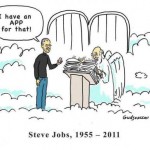Steve Jobs, z”l
 Steve Jobs, Bill Gates, and I were all born in 1955 (in fact Bill Gates and I were born on the exact same day). All three of us dropped out of school (I beat them to the punch and dropped out of high school; they didn’t drop out until college!). All three of us started companies at a relatively young age (Gates, 20; Jobs, 21; Leff 27). Alas, that’s where the commonalities probably end. Two of the three became billionaires; one’s dead, one’s retired and giving his money away. The other one, yours truly, didn’t become a billionaire, didn’t even become a millionaire, at least not in dollars and not yet, and is still working for a living. But as I am also an entrepreneurial member of the “class of 1955,” I’ve always felt some affinity for Steve Jobs and Bill Gates. So it was with sadness (and awareness of my own mortality) I noted Steve Jobs’ passing, and with some interest I read his biography by Walter Isaacson.
Steve Jobs, Bill Gates, and I were all born in 1955 (in fact Bill Gates and I were born on the exact same day). All three of us dropped out of school (I beat them to the punch and dropped out of high school; they didn’t drop out until college!). All three of us started companies at a relatively young age (Gates, 20; Jobs, 21; Leff 27). Alas, that’s where the commonalities probably end. Two of the three became billionaires; one’s dead, one’s retired and giving his money away. The other one, yours truly, didn’t become a billionaire, didn’t even become a millionaire, at least not in dollars and not yet, and is still working for a living. But as I am also an entrepreneurial member of the “class of 1955,” I’ve always felt some affinity for Steve Jobs and Bill Gates. So it was with sadness (and awareness of my own mortality) I noted Steve Jobs’ passing, and with some interest I read his biography by Walter Isaacson.
Jobs was a fascinating and complex character. He revolutionized several industries – personal computers, animated movies, and music. He had a huge impact on several other industries as well – cell phones and arguably journalism, as the iPad helped provide a way for newspapers to win subscribers who would pay to read newspapers online. He would show up for meetings in blue jeans or shorts, sit cross legged and barefoot on people’s desks. He was so obsessed with design he had a hard time buying furniture, and it took him two weeks and endless conversation to pick out a washing machine. He was mean, abusive, mercurial. When he was young he dropped acid, wandered around India, and took up Zen meditation (which does not seem to have helped mellow him much). He was also charming, charismatic, brilliant, had amazing intuition about products, and was quite eccentric. He created, and then resurrected the world’s most successful electronic device company – Apple’s market value now substantially exceeds Microsoft’s. And he did all that before dying at the age of 56. What lessons can we “mere mortals” learn from Steve Jobs’ all too brief life? Here are some of the features that I think helped him succeed:
- He was obsessed with his products. They had to be just right. There is a market for quality. His companies made a lot more money than many companies that were more obsessed on the bottom line. This does not, by the way, mean that being obsessed with your products is the only way to make money. Microsoft’s products arguably are a lot more “buggy” and less perfect than Apple’s; yet Microsoft also makes a lot of money.
- Focus. When he came back to Apple in 1997, one of the first things he did was insist they slash the number of products they were selling. He wanted only one product in each of four quadrants: desktop (professional and home) and laptop (professional and home). With typical hubris, Apple engineers would decide what configuration of computer you needed.
- People matter. He only wanted “A team” people around. He felt if you allowed in even a few “B” players, your star talent would get lazy, you’d end up with some “C” players, and you would fail. As a result he was very harsh, and didn’t hesitate to get rid of people that he felt didn’t measure up.
- Don’t rely on market research. He said it was a waste of time; no one knew they needed an iPad until they had one in their hands. It didn’t matter that previous tablet computers had been flops; that was because they were crappy products.
- One company means one bottom line. This may have been one reason they beat Sony in the music business; Sony SHOULD have won – they invented the Walkman and owned CBS Records, an industry powerhouse that included the Columbia brand name. But Sony’s divisions wouldn’t work together because they were each watching out for their own bottom line, not what was good for the company. Jobs got all the executives in one room, every week, and made sure everyone played together.
- Don’t be afraid to cannibalize yourself. If your new inventions don’t kill off your old products, someone else’s new inventions will.
- Something hard to copy: he had tremendous charisma, and was able to get people excited by his vision for new products.
- Something else hard to copy: he had great instincts. And he trusted them. He would make major decisions quickly, he was known to hire people on the spot.
It’s interesting to note that he also succeeded despite some negative personality traits:
- He was mercurial, and binary. You were either a genius or an idiot, and you could go from one to the other in an instant. It’s hard to work for someone like that.
- He was a bully. He got things done, but he probably could have got them done without being such a jerk about it.
- Lack of loyalty. There were people who were important to the early success of Apple, who he easily could have taken care of, but because he technically didn’t have to, he didn’t. Shows a certain weakness of character. His partner Wozniak was much better at remembering people who were important to their success.
- Lack of generosity. He was never much into philanthropy. He sort of made fun of Bill Gates over this; yet Bill Gates might actually do something major, like eradicate malaria. That is something worthy of tremendous respect and admiration. And even to family, he wasn’t generous. The book says the largest gift he ever gave was $750,000 to his parents, so they could pay off their mortgage and have a little extra. With his billions, he couldn’t be a little more generous than that? I think most normal people would. He could have given away ten or twenty million to friends and family and never noticed it.
He also had one tremendous strength that was also a major flaw, possibly a fatal flaw: his “reality distortion field.” He wouldn’t take “no” for an answer. He would pronounce some completely unrealistic schedule, or some completely unrealistic set of product features. And yet, thanks to the force of his vision and his ability to get brilliant people to put out 110%, they would often accomplish “the impossible.” The reality distortion field, however, worked against him in personal relationships, and it worked against him in his battle against cancer. When he was first diagnosed, he didn’t like the idea of being opened up in surgery, so he tried to will it away. His “reality distortion field” said he could get rid of the cancer by dieting, or acupuncture. So he waited nine months before he got surgery, and that nine month wait may have cost him his life: the cancer, which would have been removable, had metastasized in the meanwhile.
Something happened to Jobs as he was nearing the end of his life that I have seen happen to other people in the context of my role of rabbi: he became more open to the idea of God. He went from being more or less atheist, to being 50-50 on whether God existed. As his end was nearing, he didn’t like the idea that he would completely cease to exist. Whatever happens to his soul, however, Steve Jobs certainly leaves behind a powerful legacy.
It’s also interesting to note that, as pointed out in an article in the New Yorker, Steve Jobs wasn’t so much an inventor as he was a tweaker. He didn’t come up with new product categories out of the clear blue sky. Generally other companies were there first. He just applied his obsessive ideas about products being elegant and simple to use, and made such vast improvements in them, it was as if he created a completely new product category. Personal computers, cell phones, tablet computers, digital music, animated films all existed before Steve Jobs put his hand to them. But none of them were the same after he did!


